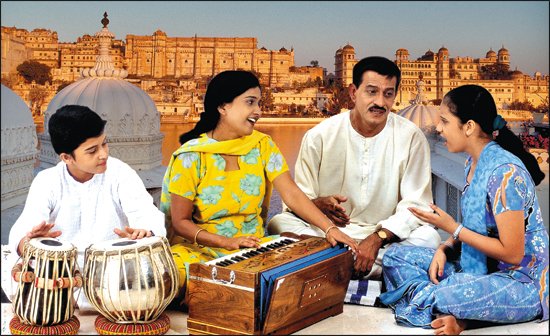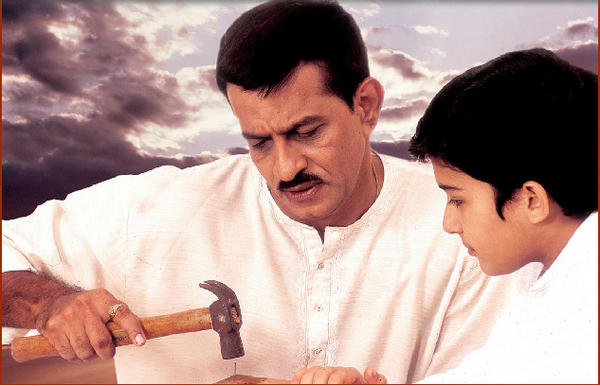
PART SIX§
TEACH CHILDREN HOW TO LIVE POSITIVELY IN THE WORLD.
Train children that the world is a positive place filled with opportunities for growth.§
The world in this sense refers to the arena of life, including where we interact with people the most, such as the home, school and our place of work. In Western thought these are not considered spiritual places. However, in Hinduism they are. There is no sharp distinction between the sacred and the secular. In the words of our paramaguru, Siva Yogaswami, “The world is an ashram—a training ground for the achievement of moksha.” §
What is it that transforms the world from a secular place into a spiritual one? It is the understanding that it is through the process of experiencing life that we unfold spiritually. It is the knowing that through fulfilling our natural duties, honestly and to the best of our ability, we make spiritual progress. Why? Through interacting with others, we learn important lessons and, as a result, gradually deepen our understanding, improve our behavior and become more spiritual. In the process, we work through karmas we created in the past and create new karmas to be faced in the future. Our daily activities, encounters and emotional reactions contribute to our spiritual progress just as much as attending pujas in the temple, studying the holy texts, meditating and worshiping in our home shrine. Paramaguru Yogaswami captured the essence of this perspective when he said, “All work must be done with the aim of reaching God.”§
Teach that life is a classroom in which we learn important lessons.§
Life is a process of learning through trial and error and thereby advancing spiritually. Gurudeva has an insightful explanation of this process: “Life is a series of experiences, one after another. Each experience can be looked at as a classroom in the big university of life if we only approach it that way. Who is going to these classrooms? Who is the member of this university of life? It’s not your instinctive mind. It’s not your intellectual mind. It’s the body of your soul, your superconscious self, that wonderful body of light. It’s maturing under the stress and strain.” §
Children live much of their day learning, often in a classroom, so the idea that all of life is a school for our soul will come easily to them, and it will teach them to value lessons wherever they come from. §

ENJOYING MUSIC AS A FAMILY BRINGS DEVOTION INTO DAILY LIFE.§
Teach about the three great powers: desire, action and wisdom.§
Important insights into the soul’s maturing process can be gained by looking at the three shaktis of God—iccha, the power of desire, kriya, the power of action and jnana, the power of wisdom—which are also the three powers of the soul. We first have a desire, and when the desire becomes strong enough we act. In young souls the action may be ill-conceived and wrongful, or adharmic, lacking in wisdom. For example, we want a computer, so we simply steal one. We need money, so we borrow with no intention to repay. The soul is repeating a cycle of similar experiences, moving back and forth from desire to action, desire to action. §
In the case of the adharmic action of stealing, eventually the soul will learn the lesson that theft is not the best way to get what we need or want. This may come from the difficult experience of being caught, or by seeing the suffering our actions cause in others. Such learning is the jnana shakti, soulful wisdom, coming forth and causing one’s behavior to improve. This process works for virtuous, or dharmic, actions as well. For example, we volunteer at the temple to teach children’s classes once a month. We are uplifted by the feeling that helping others gives us and decide to help out every week and even participate in meetings to plan out the classes. Selfless action and the reaction it has on us brings an inner joy. Therefore, jnana guides us to decide to undertake even more service and thus feel more joyful. We have again improved our behavior. If children are taught about these three basic forces at work in their life, they will seek to understand desire, think about action and strive for wisdom.
§

WORKING TOGETHER ON PROJECTS IS AN IDEAL WAY TO PASS ON YOUR BELIEFS, ATTITUDES, VALUES, INSIGHTS, SKILLS AND WISDOM.§
Conclusion§
wow, here we have it: the parent’s guidebook of minimum teachings to convey to children, based on Gurudeva’s insights gained from over 40 years of closely working with hundreds of families in a score of nations. This booklet presents a gridwork of character-building designed to augment any tradition or denomination. The key is this: start teaching early and don’t stop until your children leave the home. Even if you did nothing more than what is outlined in these 16 pages, that would be enough to send them on their way as good Hindus, wellequipped to live as happy, eff ective citizens of the modern world. Reprints of this parenting guide are available at: www.himalayanacademy.com/teachingtools/§